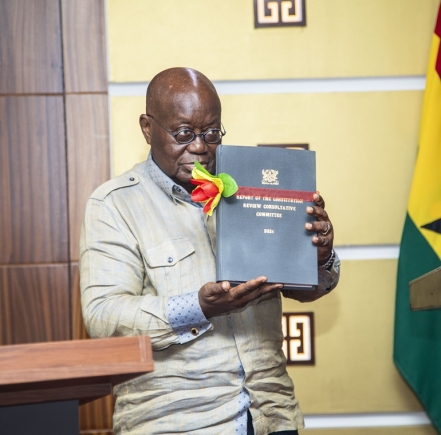
Constitutional Review Consultative Committee submits report to President Akufo-Addo
The Constitutional Review Consultative Committee (CRCC) has submitted its report to President Nana Addo Dankwa Akufo-Addo.
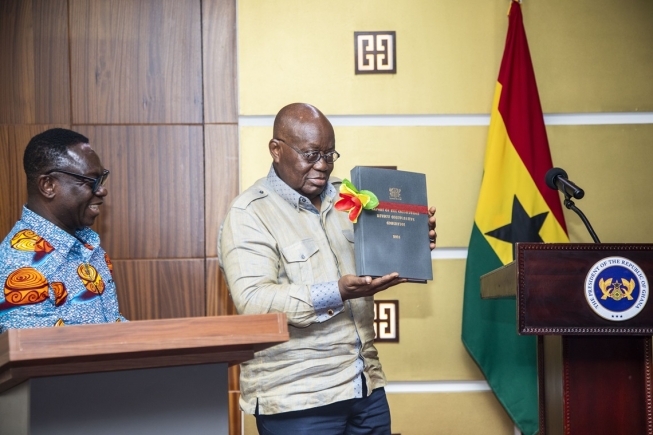
EXECUTIVE SUMMARY
On April 28, 2023, the member of Parliament for the Suame constituency and Minister for Parliamentary Affairs, Hon. Osei Kyei-Mensah-Bonsu, under the auspices of the Ministry of Parliamentary Affairs (MoPA) inaugurated the Constitution Review Consultative Committee, (the “CRCC”) to:
A. Review the 2011 report of the Constitution Review Committee (CRC);
B. Review submissions, proposals, and reports on various constitutional review platforms such as Kwame Nkrumah University of Science and Technology (KNUST), Institute of Economic Affairs (IEA), University of Ghana School of Law, University of Professional Studies Accra (UPSA), Ghana Institute of Management and Public Administration (GIMPA) etc.;
C. Make recommendations to the MoPA and its partners and collaborators such as the National Commission on Civic Education (NCCE), Africa Centre for Economic Transformation (ACET), IEA, Centre for Democratic Development (CDD), Institute of Democratic and Economic Governance (IDEG), National Development Planning Commission (NDPC), among others; and
D. Submit a report to the Honourable Minister on the Committee’s preliminary suggestions or firm resolve for a review of the 1992 Constitution.
The CRCC is made up of institutional representation through a process where the various institutions freely and independently nominate persons unto the Committee. These institutions are:
(1) the Ministry of Justice and Attorney-General's Department (MoJAGD),
(2) the Ministry of Parliamentary Affairs (MoPA),
(3) the Commission on Human Rights and Administrative Justice (CHRAJ),
(4) the National Commission on Civic Education (NCCE),
(5) the Audit Service,
(6) the National Development Planning Commission (NDPC),
(7) the Judicial Service,
(8) the Ghana Bar Association (GBA),
(9) the National Media Commission (NMC),
(10) the Parliamentary Service,
(11) the University of Ghana School of Law, (UGSoL), and
(12) African Center for Economic Transformation, (ACET).
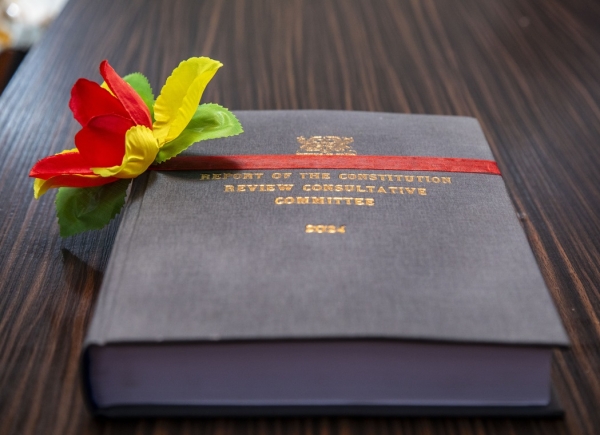
Coincidentally, the members sent to the Committee from the various institutions include:
(i) members who were on the Consultative Assembly that drafted the 1992 Constitution, and so have an insight into the reasons that produced the 1992 Constitution;
(ii) members who were part of the CRC that produced the CRC Report of 2011; and
(iii) a cross section of the Ghanaian society including civil society.
The Committee at its maiden meeting unanimously elected Clara Kowlaga Beeri Kasser-Tee, Esq. as its chairperson. She represents the University of Ghana School of Law on the Committee.
In producing this report, the Committee used a participatory qualitative methodology through consultations, desk review, comparative analysis, historical analysis and stakeholder validations. The Committee has also avoided duplication of efforts, and therefore relied on existing data and reports of similar nature where applicable.
Among other things, the Committee has reviewed thoroughly the CRC Report of 2011 which used a methodology that directly and indirectly reached millions of Ghanaians (individuals, groups, institutions), including Ghanaians living abroad.
The total number of formal submissions received, processed, coded, and stored in a database by the CRC is captured as 83,161. The views of the millions of Ghanaians who participated in the consultative processes of the CRC, directly or through traditional and new media, without formally making submissions are also thus represented in this Report.
Furthermore, the Committee reviewed over 50 Stakeholder submissions that it received from the Ministry of Parliamentary Affairs, including emails from citizens. Copies of the stakeholder submissions received are included in this report as Appendix 4.
Finally, the Committee participated in stakeholder validation workshops where it presented its findings and recommendations for feedback.
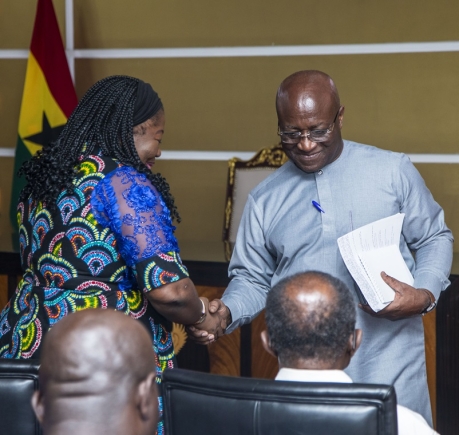
In carrying out its mandate, the Committee undertook a clause-by-clause consideration of the 1992 Constitution in its entirety vis-a-vis the CRC report of 2011 and the other stakeholder submissions received since the CRC report.
In its recommendations, the Committee was guided by the underpinning values of the 1992 Constitution, such as liberty, equality of opportunity, prosperity, inclusion, respect for diversity, freedom and justice, accountability, rule of law, protection and preservation of human rights, unity of our nation, stability of our nation, sovereignty of the people of Ghana, respect for our cultural heritage, friendship and peace with all peoples of the world, and other democratic values.
All of these were against the backdrop that constitutions are broad frameworks rather than manuals, so unnecessary detail is not suited for inclusion in a national constitution. The Committee needed to agree on this principle from the onset because some of the submissions that were received included descriptive details that are not suitable for inclusion in a national constitution.
While clarity is a value that the Committee pursued, this was done devoid of unnecessary descriptive details that should belong in other forms of legislation or regulations rather than in a national constitution. So, the Committee gleaned the broad principles from these submissions and reduced them to a framework suitable for a national constitution.

The Committee’s work on its recommendations were largely by consensus, and, in contested situations, by the vote of simple majority. Members who lost the vote exhibited good team spirit by fully supporting the continued work of the Committee to achieve the mandate thrust on it.
Throughout its consultations and review, the Committee adopted for itself three guiding principles as follows:
1. Does it belong in the Constitution, or does it belong in an Act, Regulation, political party constitution, etc.?
2. Does the current provision achieve the effect, or the current provision necessarily needs to be amended?
3. Is the recommended amendment consistent with the clear values of the Constitution, the history of our Republic, democratic values and cultural heritage?
The objective of the Committee is for its recommendations to reflect who we are as a people, where we are 12 years on since the CRC report, where we want to be in our democratic journey, and recommend a constitutional framework that puts us in a position to pursue what the Committee sees as the Ghanaian aspiration for democracy, i.e., to establish for ourselves and posterity a framework of government which shall secure the blessings of liberty, equality of opportunity and prosperity.

Summary of Recommendations
The recommendations in this report cover the proposed process for the amendment of the Constitution as well as thematic areas. Notable ones are as follows:
General Amendment Procedure of the Constitution
The Constitution provides within itself, its own procedures for changing any of its provisions if, for any reason, that provision no longer serves the people well. The lawful means of changing any or all the provisions of the Constitution is by amendment. The Constitution provides two ways by which it can be amended:
1. Through an Act of Parliament, (for non-entrenched provisions); or
2. Referendum, (for entrenched provisions).
The Attachment to the CRC Report of 2011 contained two Draft Bills for the amendment of the Constitution. One of the draft Bills was for the amendment of non-entrenched provisions; and the other was for the proposed amendment of the entrenched provisions. The draft bills with respect to the amendment of the non-entrenched provisions specified all the proposed amendments falling within non-entrenched articles, and that for the entrenched provisions did the same. The amendment for entrenched provisions was therefore to be done in a single Bill, although this Bill indicated the specific provisions requiring amendment. These draft bills are included in this Report in Appendix 5. The Committee recommends the following amendment procedures;
1. With respect to entrenched provisions, (as these require a referendum), proposed amendments must be done in separate individual Bills in accordance with subject matter and consequential amendments, rather than in a single bill specifying all entrenched provisions proposed for amendment. Each proposed bill for amendment, (containing not more than one subject matter at a time), must be voted on separately. However, more than one proposed amendment may be presented to the Referendum provided that it permits the people to vote for each of them separately.
2. With respect to non-entrenched provisions, we agree with the CRC proposal, i.e. that it may be presented in a single Bill.
It is our considered view that the above procedure gives the people of Ghana, the opportunity to reflect on the effect of each amendment and decide whether or not they want that particular amendment. Putting the amendments together in a single bill denies the people the right to decide which specific bills they want, and which specific bills they do not. We are of the view that this is more consistent with democratic values than putting all amendments in a single bill, as it is entirely possible that some may want specific amendments, but not others. While putting the amendments together in a single bill therefore denies the people a true choice in the matter, offering the people a chance to decide on each bill independently validates the people’s agency in the referendum. We propose a similar approach for proposed amendments of non-entrenched provisions, (which do not require a referendum), (i.e., that amendments be pursuant to separate bills grouped in accordance with subject matter and consequential amendments). However, as Parliament has deliberative powers over bills, an alternative approach for the amendment of non-entrenched provisions, would be to align with the original proposal of the Constitutional Review Commission (CRC) and consolidate all changes into a single comprehensive option.
Specific Recommended Amendments:
a. Determination of the Conditions of Service of Some Public Officers by the President, (i.e., Article 71 Holders)
The Committee recommends that the emoluments of article 71 holders must be determined pursuant to a predetermined formula. This predetermined formula is to be set by an Independent Emoluments Committee, (IEC), composed of one representative each from the following institutions: the
● Public Services Commission,
● Ministry responsible for Finance,
● Organised Labour,
● Audit Service, and
● Fair Wages and Salaries Commission.
The mandate of this IEC shall be to prescribe an emolument formula for the emoluments of article 71 holders. The emoluments of article 71 holders shall thereafter be determined pursuant to this formula, without the need to set up any further committees in the future.
The institutions shall nominate their representatives, and the President shall appoint them.
The emoluments of this IEC shall be similar to sitting allowances applicable to public Boards and Committees, and the IEC is to be dissolved after setting the pre-determined formula. The formula shall thereafter be managed by the Fair Wages and Salaries Commission.
This avoids the continuous setting up of committees to determine the emoluments of article 71 holders.
b. Parliament
The Committee recommends that the size of parliament be capped to two hundred and seventy-seven elected members. Article 93 of the Constitution should therefore be amended to read as follows: “There shall be a Parliament of Ghana which shall consist of not more than two hundred and seventy-seven elected members.”
The implication of this is that there must be consequential amendments to Article 47 to place a numerical cap on the number of constituencies that Ghana must have. Article 47 must therefore be amended to read as follows - “Ghana shall be divided into as many constituencies for the purpose of election of Members of Parliament as the Electoral Commission may prescribe; however, the number of constituencies shall not exceed two hundred and seventy-seven.
The reasons for the choice of two hundred and seventy-seven elected members as the maximum number are two: (a) recommending a lesser number than the existing number will require that certain constituencies be scrapped. The decision on which constituencies to scrap would involve politicians and their followers, and it is not reasonably expected that a political party would approve that constituencies in its stronghold be scrapped. On the other hand, it can be reasonably expected that each political party is more likely to lean towards recommending constituencies in its opponent’s stronghold to be scrapped. This would invariably result in needless acrimony.
Not recommending a reduction would therefore be the less acrimonious option; (b) the existing constituencies are already two hundred and seventy-six. As an odd number is to be preferable, we recommend an upper limit of two hundred and seventy-seven.
c. Appointment of Ministers from Parliament
The Committee recommends that the President must have the option of appointing persons including members of parliament as ministers, provided that a Member of Parliament who is appointed as a minister shall vacate their seat. This is to address the challenge of the situation where some persons may contest for parliamentary positions not because they are interested in the work of parliament, but rather because being a member of parliament is also a means to earn an appointment as a minister of state.
d. Cap on Appointment of Ministers and Deputy Ministers
The Committee recommends that there must be an upper limit on the number of Ministers and Deputy Ministers that a President can appoint, and this upper limit should be 55.
e. Declaration of Assets
The Committee recommends the inclusion of a requirement for the Auditor-General to verify the assets declared and a certificate of verification to be issued to the person. The Auditor General shall audit the declaration to satisfy themself whether the assets are legitimately acquired or reasonably attributable to one's income. Thus, any property or assets acquired by a public officer after the initial declaration required by Article 286 clause (1) and which is not reasonably attributable to income, gift, loan, inheritance or any other reasonable source shall be deemed to have been acquired in contravention of this Constitution.
The relevant provision on Declaration of Assets thus should read as follows:
1. A person who holds a public office mentioned in clause (5) of this Article shall submit to the Auditor-General a written declaration of all property or assets owned by, or liabilities owed by that person, whether directly or indirectly-
a. within three months after the coming into force of this Constitution or before taking office, as the case may be,
b. at the end of every four years; and
c. at the end of their term of office.
2. Failure to declare or knowingly making false declaration shall be in contravention of this Constitution and shall be dealt with in accordance with Article 287 of this Constitution.
3. Any property or assets acquired by a public officer after the initial declaration required by clause (1) of this Article and which is not reasonably attributable to income, gift, loan, inheritance or any other reasonable source shall be deemed to have been acquired in contravention of this Constitution.
4. The public offices to which the provisions of this Article apply are those of—
(a) the President of the Republic;
(b) the Vice-President of the Republic;
(c) the Speaker, the Deputy Speaker and a member of Parliament;
(d) Minister of State or Deputy Minister;
(e) Chief Justice, Justice of the Superior Court of Judicature,
(f) the Commissioner for Human Rights and Administrative Justice and his Deputies and all judicial officers;
(g) Ambassador or High Commissioner;
(h) Secretary to the Cabinet;
(i) Head of Ministry or government department or equivalent office in the Civil Service;
(j) The Administrator of the District Assemblies Common Fund;
(k) Chairperson and Members of Council of State;
(l) Metropolitan, Municipal and District Chief Executives;
(m) Chairperson and Deputy of the Electoral Commission;
(n) The Administrator of GETFUND;
(o) chairman, managing director, general manager and departmental head of a public corporation or company in which the State has a controlling interest; and
(p) such officers in the public service and any other public institution as Parliament may prescribe.
5. The Auditor-General shall verify the assets declared and a certificate of verification shall be issued to the person.
f. Payment of Tax by the President
Article 68 (5) exempts the President from the payment of income tax.
The Committee recommends that the President should pay tax on his salary and emoluments as an example to the rest of the citizenry. This will also reflect the principle of equality before the law and accord with the rule of law.
Article 68 (5) therefore should be deleted to mandate the President of the country to pay tax. The amendment of this provision will trigger the necessary consequential amendment in the income tax law of the country.
g. The National Development Planning Commission, (the “NDPC”)
All the submissions received on the NDPC expressed the need for the NDPC to be independent de facto and de jure; inclusive in composition; able to develop or formulate and periodically revise the national development plan; be national in character, etc.
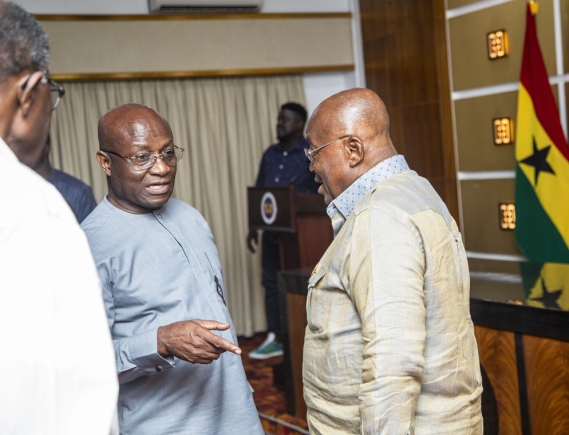
Furthermore, the desire to have a national long-term development plan was evident in the submissions received. Among the reasons for this was a guard against interruptions in the developmental progress of the country due to changes in political leadership and abandonment of some of the developmental projects because of these changes.
To achieve the above objectives, this Committee recommends an amendment to the composition of the NDPC to include:
1. the Minister responsible for Finance;
2. a former Minister responsible for Finance who must not belong to the same political party as the sitting Minister responsible for Finance;
3. Three representatives from university teachers’ associations in Ghana, who must have demonstrable expertise in economic, environmental, spatial planning or other relevant sectors;
4. A representative from a political party that attains at least 10% votes in general elections, to be nominated by the political party;
5. the Governor, Central Bank;
6. the Government’s Statistician;
7. a representative of the Association of Bankers, to be nominated by the Association;
8. a representative from the Association of Ghana industries, to be nominated by the Association;
9. a representative from organised labour to be nominated by the organised labour;
10. a representative from Ghana Employers Association to be nominated by the Association;
11. a representative from trader’s associations to be nominated by the associations;
12. a representative from Ghana Farmers and Fishermen Association to be nominated by the Association;
13. a representative with competencies in development, economic, social, environment, spatial planning, technological or other relevant sectors each from the Coastal, Middle Belt and Savannah Economic Zones, to be nominated by the relevant regional coordinating councils in the respective Economic Zones;
14. the Director General of NDPC;
15. two representatives from National House of Chiefs, one of whom must be a woman;
16. A representative from the Federation of Persons living with Disability to be nominated by the Federation;
17. A representative from civil society organisations to be nominated by civil society;
18. A representative from private sector enterprises to nominated by private enterprises federation; and
19. such other persons, not exceeding three, at least one of whom must be a woman, to be appointed by the President having regard to their knowledge and experience of the relevant areas and roles pertaining to development, economic, social, environmental, spatial planning or other relevant sectors.
The tenure of the members of the NDPC shall be 7 years non-renewable and shall not be coterminous with that of the President.
The Committee recommends the following to be included to the existing functions of the NDPC: The Commission shall:
i. Formulate a long-term National Development Plan taking into consideration the resource potential and comparative advantage of the various regions and districts of Ghana for approval by Parliament.
ii. Revise the National Development Plan every ten years or such earlier period as may be approved by Parliament by two-thirds majority of all members of parliament.
iii. monitor, evaluate and co-ordinate development policies, programmes and projects and submit an annual report to Parliament.
iv. The other provisions on functions to stay.
The NDPC’s annual report to Parliament shall indicate to what extent the Government of the day has adhered to the national development plan, and to what extent the plan requires modification.
h. The National Security Council
The Committee recommends that the following be included in the existing National Security Council provision:
a. the head of Ghana Immigration Service
b. Minister responsible for National Security
c. Economic and Organized Crime Office
d. the head of Ghana National Fire Service
e. the head of National Commission of Small Arms and Light Weapons
f. the head of National Disaster Management Organization, and
g. three persons appointed by the President, at least one of whom must be a woman.
This Committee recommends an amendment to the composition of the National Security Council to include:
1. the President,
2. the Vice-President,
3. the Ministers responsible for foreign affairs, defence, interior, and finance,
4. the Chief of Defence Staff and two other Service commanders who do not belong to the same Service of the Armed Forces,
5. the Inspector-General of Police and two other members of the Police Service, one of whom shall be the Commissioner of Police responsible for Criminal Investigations Department;
6. the Director-General of the Prisons Service;
7. the Director of External Intelligence;
8. the Director of Internal Intelligence;
9. the Director of Military Intelligence;
10. the Commissioner General of Ghana Revenue Authority, the head of Ghana Immigration Service;
11. Minister responsible for National Security;
12. the head of Economic and Organized Crime Office;
13. the head of Ghana National Fire Service;
14. the head of National Commission of Small Arms and Light Weapons;
15. the head of National Disaster Management Organization; and
16. three persons appointed by the President, one of whom must be a woman.
i. Decentralisation and Local Government
The Committee recommends the election of the Chief Executive Officer by the registered voters of the area in a public election. A person shall be elected if the person obtains a simple majority of the valid votes cast. Consequently, the only way the office of the Chief Executive shall become vacant is as follows:
· a vote of no confidence, supported by the votes of not less than two-thirds of all the members of the District Assembly is passed against them; or
· they resign or die.
· if any circumstance arise that would cause him to be disqualified or ineligible for election, under article 94 of this Constitution.
Article 246 should be amended by inserting a clause 3 which provides that where a vacancy occurs in the membership of a District Assembly, the District Coordinating Director of the Assembly shall notify the Electoral Commission in writing within seven days of becoming aware of the vacancy and the Electoral Commission shall, within thirty days of being notified, hold a by-election to fill the vacancy, except that where the vacancy is as a result of the death of a member, the by- election shall be held within sixty days after the occurrence of the vacancy.
Qualifications and Procedures:
The Committee recommends for Article 247 to require the qualifications for Chief Executive and membership of a District Assembly, the procedures of a District Assembly and other local government units lower than a District Assembly that may be created to be provided for by an Act of Parliament, through an amendment to the Local Government Act.
j. Judiciary – Efficient Administration of Justice
The Committee among other things recommends the amendment of Article 144(6) so that a petition for the removal of the Chief Justice shall require the President to act in consultation with the Council of State, and upon determining that a prima facie case has been made, appoint a committee consisting of two Justices of the Supreme Court, one of whom shall be appointed chairperson by the President, and three other persons who are not members of the Council of State, nor members of Parliament, nor lawyers. The rules and regulations for regulating the practice and procedure for the removal of supreme court judges, chief justice, chairpersons of the electoral commission, etc. shall be made by the Rules of Court Committee pursuant to article 154(2).
k. Fundamental Human Rights
o Right to Fair Trial
One of the requirements of a democracy is the right to a speedy trial. The Committee therefore recommends that the trial of persons charged with criminal offences shall commence not later than 6 months.
o The right to good healthcare
Although the Constitution provides for the right of the sick, it does not expressly provide for the right to good healthcare. The Committee therefore recommends an amendment to include that every person has a right to good healthcare.
o Article 17(2):
The Committee received several submissions with respect to Article 17(2). The submissions related to a request to expand the category of discrimination in Article 17(2) to include “discrimination based on disability”. This arises from the historical fact that ‘disability’ has been a ground to discriminate negatively against persons with disability. ‘Persons with disability’ must therefore be included in the category of discrimination both as protection for persons with disabilities and awareness of the ground of disability.
Article 17(2) reads as follows:
“A person shall not be discriminated against on grounds of gender, race, colour, ethnic origin, religion, creed or social or economic status”.
Committee’s recommendation:
The Committee recommends that persons with disability should be included in the list of those not to be discriminated against. So, the Article should now read as follows:
“A person shall not be discriminated against on grounds of gender, race, colour, ethnic origin, religion, disability, political opinion, creed or social or economic status”
Consequently, all constitutional provisions related to the enforcement of fundamental human rights and prevention of discrimination should reflect this. These include Articles 12 (2), 17(2) and 35 (5).
l. Commission on Human Rights and Administrative Justice (CHRAJ)
Article 218(1) of the Constitution provides as follows:
“The functions of the Commission shall be defined and prescribed by Act of Parliament and shall include the duty-
(a) to investigate complaints of violations of fundamental rights and freedoms, injustice, corruption, abuse of power and unfair treatment of any person by a public officer in the exercise of his duties”.
This provision has been interpreted to mean that CHRAJ cannot investigate alleged violations under this provision in the absence of an identifiable complainant. The Committee received submissions advocating that this provision be amended to permit the Commission to investigate violations under this provision whether or not there is a complainant. It was argued that due to fear of retribution, many complainants may be uncomfortable to formally file complaints of violations under this provision. It would therefore serve a beneficial social value and as a rights protection regime if CHRAJ is empowered to investigate violations falling under the above-mentioned provision in appropriate cases, on its own, (i.e., without the need for a complainant).
The Committee’s recommendations
The Committee recommends the amendment of article 218(a) to empower CHRAJ to investigate certain complaints whether or not it has a complainant. Article 218(a) should therefore be amended to read as follows:
The functions of the Commission shall be defined and prescribed by Act of Parliament and shall include the duty
i. to investigate all instances of violations of fundamental rights and freedoms, injustice, corruption, abuse of power and unfair treatment of any person by a public officer in the exercise of their official duties.
ii. to investigate matters concerning practises and actions by public officers in respect of alleged violation of their fundamental human rights.
j. Appointments of Heads of Independent Constitutional Bodies (ICBs)
To address concerns raised by stakeholders on the influence of the executive in the appointment process of the heads of ICBs, a revision of the current appointment procedure is recommended. The Committee recommends that the heads of ICBs be appointed by an open competitive process which includes parliamentary vetting and approval, after which the successful candidates are appointed by the President.
The Committee recommends that this appointment procedure be extended to all the heads of the ICBs including the Electoral Commission, National Commission on Civic Education (NCCE) and the Government Statistician,
m. Immunity from Service Process and Arrest
Another article which has raised contested views was Article 117, with many suggesting that the constitutional immunity granted under this clause should be revoked. Upon careful consideration by the Committee, it is recommended that the desirable amendment will be to simply delete the word “arrest" from the title of the provision.
Writer's email:
